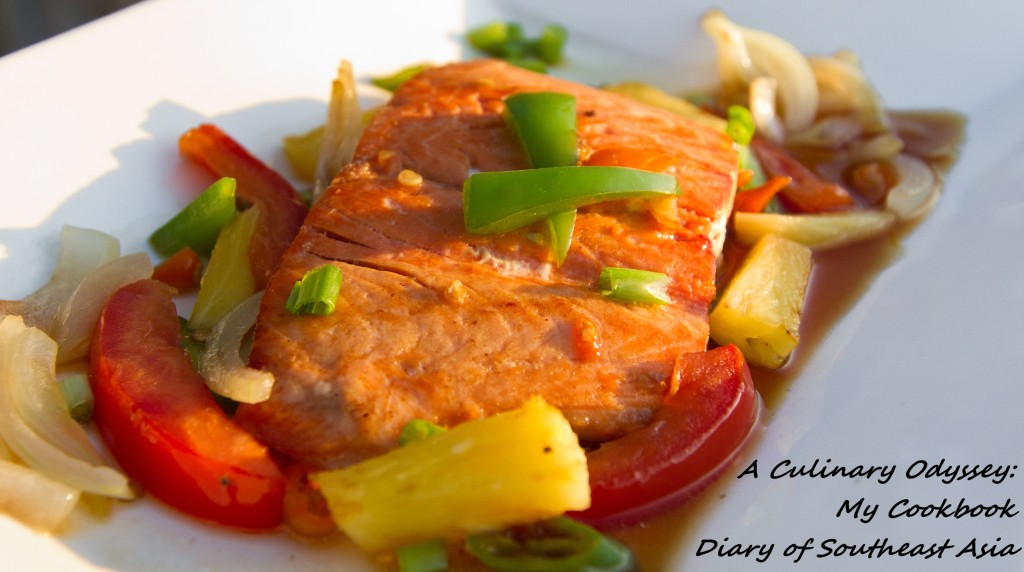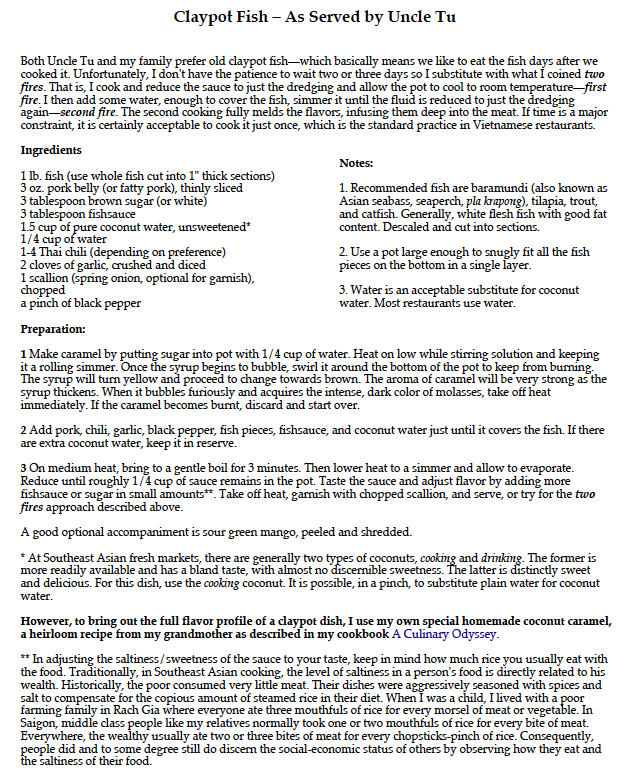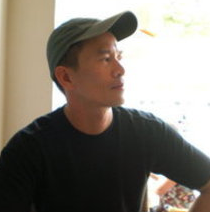Remember Andrew Pham’s acclaimed memoirs Catfish and Mandala and The Eaves of Heaven? He’s back — this time with culinary memories. Pham invokes meals from Viet Nam, where he was born, and from Thailand, Laos, and Cambodia, where he’s lived during the past decade. Here diaCRITIC Genevieve Erin O’Brien interviews Pham on his forthcoming release, A Culinary Odyssey: My Cookbook Diary of Travels, Flavors, and Memories of Southeast Asia. The interview links to his Kickstarter campaign, where you can get an electronic version or bound volume, if you contribute by December 2o, 2011. Pham explains, “A Culinary Odyssey is only 40 recipes. It is a humble work from the heart, not an ambitious encyclopedic tome filled with dishes most readers will never cook. I have no desire to repeat what others have done.” Foodies rejoice!

How did you get from biking across Vietnam to writing a cookbook?
A touring bicyclist can easily burn up to 6,000 calories per day. The reward for putting out all that sweaty effort is prodigious gorging and imbiling of all things magnificent without gaining a pound. To really eat well, a touring cyclist must know a little about food, whether it’s food in a restaurant or food cooked at home. I know plenty about food and cooking, and I’m a writer and a restaurant critic. It is perfectly logical that I should write a cookbook. In fact, I’ve always wanted to write a “true cookbook” by which I mean a book that celebrates not just food but everything that surrounds it.
[amazon_enhanced asin=”0312267177″ /]
Can you tell me a bit about your new project this cookbook with 40 recipes?
I’ve been a foodie ever since I could remember–probably because my entire childhood and adolescent were filled with stretches of hunger and brief periods of fabulous feasts. When I “grew up” and began to earn a professional income, the first thing I did was buy some nice suits, and then I struck out on the town, hot on the trails of restaurant critics. My good friends were all professionals with expense accounts, some with executive sales accounts–the holy grails of free dining. We took turns treating each other to wonderful meals while discussing business, of course. This really got me interested in food and was the real beginning of my culinary education.
When I landed in Southeast Asia for my decade long sojourn, I began eating my way back and forth across four countries and collecting recipes. These are my favorites which naturally includes 14 of my family’s recipes. It’s not just a cookbook, it’s travels, flavors, and memories–basically everything I know about food.
What is your favorite recipe/dish from the cookbook?
For me, a dish is invarriably tied so a memory, a place, a sensation, and/or people. Eating springrolls always brings me a sense of happiness because this is my family’s food of celebration. It is the one dish that my grandmother and mother have consistently made to express their joys and to share that feeling with the whole family. This is my favorite recipe, and IMHO it’s the best darn springroll I’ve ever eaten.
What is your earliest childhood memory of food?
My parents used to go out of town for business and left me with a nanny who often abandoned me at home alone. I usually survived on claypot catfish and a tub of rice for a couple of days. Many strange emotions have been entangled in the flavors of this dish.

What one dish just never tastes the same as it does in Vietnam?
Pho. In Vietnam, there are numerous distinct recipes. Oddly, in American, pho is basically variations of the three of the most successful (read accessible) recipes.
How does food relate to family for you?
That’s still in development, as I don’t have a family of my own yet. When I was a child, dinnertime at our house was a bizarre affair. My parents ate in one room, while the rest of us ate in the other.
How does it relate to a sense of home?
A home without an active kitchen, full-table meals, and festive dinner parties is just four walls and a roof.
Where would you consider home to be?
Home, for me, is a three-fold concept. First, it must be a place that has a past–that is to say a person must inhabit a place long enough for it to become home. Second, it is a state of presence–whether he is in a hotel room or in his house. In other words, it is a state of mind. Third, it is a place where a person could envision his future.
For me, home is a small wooden bungalow I built on the Mekong with a fishpond filled with water lilies and a view of Elephant Mountain within hiking distance.
In what way does food tell a story for you?
It doesn’t.
It’s like walking down the street and catching a whiff of perfume that a past lover wore, or hearing an old song that had encapsulated a whole period of life. It’s that thing that makes me a little dizzy and weak in the legs.
Food is about being in the present. Food, for me, is also about remembering all that is worth remembering.
What are some of the stories we can look forward to in your cookbook?
1) How a starving writer became a restaurant critic
2) The meaning of Happy Spring Rolls
3) How to cook in small kitchen
4) Where to go & What to eat in Southeast Asia
And so much more … (for more stories, please visit this link.)
How do people contribute to the kickstarter campaign?
Easy:
1) Pledge $3 to pre-order the book (or more if other rewards are desired)
2) put the word out about the project via Facebook, Tweeter, blogs, email, etc.
3) download my Season’s Greetings PDF e-card (with essays and recipes) and send to friends and enemies.
When will the cookbook be available?
If my Kickstarter is successful, it will be available to Kickstarter backers (in e-book format and printed book) by the end of March 2012, and to the public (only in e-book format) by June 2012. If my Kickstarter does not meet funding goal by Dec. 20th, I’ll have to push the above dates back by 6 months to a year because I’ll have to go flip burgers to earn the funds to publish the book. 🙂
What is your favorite recipe from the book?
Andrew’s coco-pineapple salmon, my own “quickfire” creation using pan-fried salmon steaks in a fast caramel reduction blending Vietnamese and Cambodian flavors. See pic.
When you cook, what nuoc mam do you use?
Phu Quoc in the States. Note that not all brands sell the exact same formulation in every market.
If you could have your own Vietnamese fusion food truck what would the signature dish be?
I would never have a food truck! That’s too much work. But like most guys, I’d be happy to volunteer in the Nom Nom truck with those two cute and talented cooks!
[amazon_enhanced asin=”0307381218″ /]
—

Andrew Pham is an award-winning author, food writer, restaurant critic, memoirist, biographer, creative non-fiction teacher, translator, bicycle tour guide, and aerospace engineer. He is obsessive about good food, travel, adventure, and literature. He was born in Vietnam and spent the first nine years of his life there. He has been living in Thailand, Laos, and Cambodia for the last decade. His books have won the Kiriyama Prize, Oregon Literature Prize, and the QPB Prize and have been a finalist for the National Critics Circle Award and the Guardian Prize. His books have been named Top Ten Books of the Year six times by leading literary organizations. He is a Montalvo Fellow & Lucas Resident, a Whiting Award Writer, and a Guggenheim Fellow.
Genevieve Erin O’Brien is a Vietnamese/Irish/American artist, community organizer, and popular educator. She holds an MFA in Studio Art/Performance from the School of the Art Institute of Chicago. O’Brien uses performance, video and installation to explore notions of “home” and “homeland.”
—
Please take the time to rate this post (above) and share it (below). Ratings for top posts are listed on the sidebar. Sharing (on email, Facebook, etc.) helps spread the word about diaCRITICS. And join the conversation and leave a comment! What’s your favorite recipe from Southeast Asia? Do you agree with Pham’s observation, “Food is about being in the present. Food, for me, is also about remembering all that is worth remembering”?


